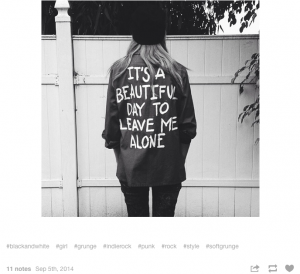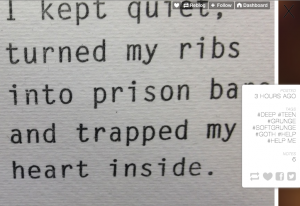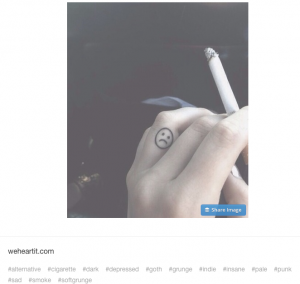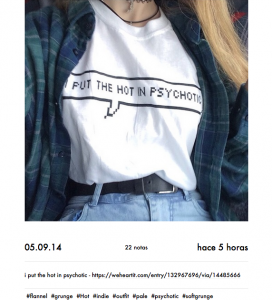[Content note: mental illness, depression, self-harm, suicide]
I’ve written before about the potential dangers of presenting depression and other mental illnesses as somehow attractive or appealing or more “real.” In a blog post dealing with the same issue, Spencer writes:
We love to romanticize depression. On Tumblr, browse the “#soft grunge” tag and you’ll find artfully edited photos of scars and Instagram-filtered pictures of cigarette cartons with phrases like “You’re going to die anyway” superimposed. “Soft grunge” treats depression and suicide like beautiful black roses–twisted, painful romantic ideals. We do it off of Tumblr too, like when we associate our favorite comedians’ or authors’ mental illnesses with their genius. Half the time, it seems, “tortured soul” is uttered in awestruck, not empathetic tones.
That post also links to another post, called “On Tumblr’s Romanticization of Depression,” by a blogger named Sarah:
Every time you reblog pictures of a computer screen that says “stupid sad girl” or Marlboro cigarettes with sticky notes pasted on them saying “because you broke my heart,” every time you contribute to a culture that makes depression seem like a quirky thing to add to your “about” section instead of a serious disorder with one of the highest death rates of any illness, you are actively making it okay for people to ignore their health problems and just be sad. That’s enablement.
People need to stop posting pictures of pills and tagging them #death, #suicide, #self hate, #soft grunge, and #pale. Trust me on this one, overdosing on pills: not really a good time. It’s nothing like the pictures of parties that are scattered all over your dashboard. A pretty blue-eyed boy will not come up to you when you’ve been lying in an ER bed for four hours because you can’t walk and tell you how beautiful you and your sadness are. Maybe that’s because you won’t be wearing pants at the time (I wasn’t), or maybe that’s because you’ll barely be able to speak because your mind is so distorted by the drugs. He won’t kiss your fucking scars. In fact it’s likely that nobody ever will, because seeing the mutilated flesh of someone you love is terrifying.

Source
In a general sense, I agree. Spencer and Sarah make the point that seeing depression presented as sexy and alluring may discourage people from viewing it as an issue to work on, and while it should always be an individual’s choice whether or not to consider themselves “mentally ill” or to seek treatment for a mental illness, normalizing such pain and suffering probably doesn’t help.
But then I started thinking–how many of the people posting these things are depressed themselves, and how much moral responsibility should we assign to a person in the depths of mental illness to avoid presenting their own condition in a way that may encourage others to follow suit?
Sarah allows for this possibility, including a caveat:
Which isn’t to say that no girl with a soft grunge blog is actually diagnosed with depression (or any other mental illness), because I’m sure many are. And I think I can kind of understand the appeal. Feeling like you’re a part of something can be comforting, and so can seeing that other people feel the same way you do. When you’re in the healing stages of a mental illness, having support isn’t just important, it’s a necessity. But the soft grunge subculture doesn’t support the “Sad Girls” it idolizes, it enables them.
However, I’m not sure that really answers my question.

First of all, I take issue with the term “enablement” as used here. Professionals and others usually use this term to mean doing things that encourage someone else to behave self-destructively. For instance, someone may “enable” a friend’s problem drinking by constantly offering them alcohol or inviting them out to bars; a parent may “enable” a child’s preoccupation with getting high grades by grilling them about their grades and expressing disappointment at anything less than an “A.”
But I’m not sure what exactly Sarah thinks is being “enabled” here. If it’s depression itself, then that doesn’t make sense, because depression is not a risky or maladaptive behavior that can be enabled. It’s a mental illness. It could also be not getting treatment for depression, but I’m not sure that makes sense as a behavior that can be “enabled,” either. Not getting treatment for depression is, sadly, the default. True, if people’s Tumblr feeds were filled with age-appropriate, compassionate advice about seeking help for emotional distress, they might be more likely to do so. But in that case, the entire way the dominant culture approaches mental illness qualifies as “enablement.” In that case, every time a friend told me to “just cheer up!” or “just come hang out with us!” when I was feeling sad, they were “enabling” my behavior of not seeking treatment, because they were suggesting that depression is something that can be fixed by choosing to “just cheer up” or go to a party.

More to the point, I think that this view somewhat discounts the very realistic possibility that the people posting these “soft grunge” images are themselves depressed, and what this means about “enablement.” Who are they enabling? Themselves? Each other? Others who are more or less depressed than they are? Younger Tumblr users?
It’s complicated to me because I view this type of self-expression–the romanticization, the preoccupation with death, the attention-seeking (which I do not mean pejoratively)–as part of the mental illness itself. As a symptom, even. I haven’t seen any studies about this and have no idea which Google Scholar keywords could possibly help, but anecdotally, my experience with people who suffer from mood disorders is that some of them cope with the illness by viewing themselves and the illness in this way. Not all, obviously, but almost no mental illness symptom is shared by everyone who has that diagnosis, so to call something a symptom is not to imply that it’s a universal symptom.
It is sometimes comforting, especially when you’re scared and don’t know what’s happening to you and lack the knowledge to label it “depression,” to think of it as something special and even positive. This is especially the case when you’ve been steeped in a culture that glorifies a certain type of disaffected sadness, and ties it causally to greatness in art, music, and literature. So, even if the girls of the soft grunge subculture are enabling others, that’s only because they were first enabled themselves.
Some of it is a sort of sour grapes thing, too. You try to be happy, you can’t, everything hurts, and you think, fuck it, who wants that boring shit, anyway?

Source
When I was in high school, I didn’t have a Tumblr (I don’t think it existed yet), but I definitely found these types of images appealing in some way. Maybe if something like Tumblr existed I would’ve even shared them. The reason they appealed to me was because they made me feel like the way I felt was a way of being more alive, not a way of missing things that other people got to have–joy, security, optimism, hope, self-esteem. And even if I didn’t meet the diagnostic criteria for depression at the time, I certainly did just a couple years later when I was diagnosed with it.
I don’t think that any of this necessarily makes promoting such memes and images ethically okay. Most of us have no problem condemning pro-ana/-mia blogs and forums, for instance, and this is really the depression/bipolar disorder version of that. (I suppose, though, you could argue that pro-ana/-mia materials are more dangerous than “pro-depression” materials, if you could even call these Tumblrs that.)
But it does mean that it’s not as simple as telling people to stop doing it.
I think the first step would be to start taking adolescent mental health seriously. It’s a serious issue. Most people know this, I think, on some level. But we still don’t take a preventative approach.
It’s expected that parents start taking their children in for dental checkups as soon as they have teeth. It’s expected to start seeing an ob/gyn for checkups as soon as you become sexually active. Why not taking that sort of proactive approach to mental health in adolescence–or even in childhood?
(Of course, all of that is bound up in issues of privilege and access, but even teenagers whose parents can easily afford and access mental healthcare often fail to receive it until things become very bad.)
So, yeah, in short, I don’t disagree with either of the perspectives I linked to. I just think it’s a little more complicated than I ever realized before. It’s easy to say, “Don’t romanticize depression! It encourages people to view depression as normal and healthy.” It’s harder to say, “Don’t show symptoms of your depression! It encourages people to view depression as normal and healthy.”
